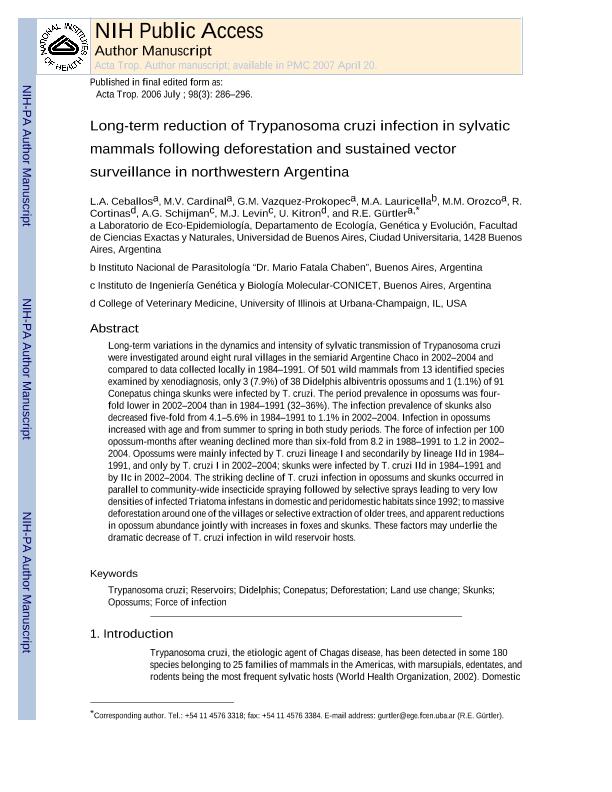Artículo
Long-term reduction of Trypanosoma cruzi infection in sylvatic mammals following deforestation and sustained vector surveillance in northwestern Argentina
Ceballos, Leonardo A.; Cardinal, Marta Victoria ; Vazquez Prokopec, Gonzalo Martin
; Vazquez Prokopec, Gonzalo Martin ; Lauricella, Marta Alicia; Orozco, Maria Marcela
; Lauricella, Marta Alicia; Orozco, Maria Marcela ; Cortinas, Roberto; Schijman, Alejandro Gabriel
; Cortinas, Roberto; Schijman, Alejandro Gabriel ; Levin, Mariano Jorge
; Levin, Mariano Jorge ; Kitron, Uriel D.; Gurtler, Ricardo Esteban
; Kitron, Uriel D.; Gurtler, Ricardo Esteban
 ; Vazquez Prokopec, Gonzalo Martin
; Vazquez Prokopec, Gonzalo Martin ; Lauricella, Marta Alicia; Orozco, Maria Marcela
; Lauricella, Marta Alicia; Orozco, Maria Marcela ; Cortinas, Roberto; Schijman, Alejandro Gabriel
; Cortinas, Roberto; Schijman, Alejandro Gabriel ; Levin, Mariano Jorge
; Levin, Mariano Jorge ; Kitron, Uriel D.; Gurtler, Ricardo Esteban
; Kitron, Uriel D.; Gurtler, Ricardo Esteban
Fecha de publicación:
07/2006
Editorial:
Elsevier Science
Revista:
Acta Tropica
ISSN:
0001-706X
Idioma:
Inglés
Tipo de recurso:
Artículo publicado
Clasificación temática:
Resumen
Long-term variations in the dynamics and intensity of sylvatic transmission of Trypanosoma cruzi were investigated around eight rural villages in the semiarid Argentine Chaco in 2002-2004 and compared to data collected locally in 1984-1991. Of 501 wild mammals from 13 identified species examined by xenodiagnosis, only 3 (7.9%) of 38 Didelphis albiventris opossums and 1 (1.1%) of 91 Conepatus chinga skunks were infected by T. cruzi. The period prevalence in opossums was four-fold lower in 2002-2004 than in 1984-1991 (32-36%). The infection prevalence of skunks also decreased five-fold from 4.1-5.6% in 1984-1991 to 1.1% in 2002-2004. Infection in opossums increased with age and from summer to spring in both study periods. The force of infection per 100 opossum-months after weaning declined more than six-fold from 8.2 in 1988-1991 to 1.2 in 2002-2004. Opossums were mainly infected by T. cruzi lineage I and secondarily by lineage IId in 1984-1991, and only by T. cruzi I in 2002-2004; skunks were infected by T. cruzi IId in 1984-1991 and by IIc in 2002-2004. The striking decline of T. cruzi infection in opossums and skunks occurred in parallel to community-wide insecticide spraying followed by selective sprays leading to very low densities of infected Triatoma infestans in domestic and peridomestic habitats since 1992; to massive deforestation around one of the villages or selective extraction of older trees, and apparent reductions in opossum abundance jointly with increases in foxes and skunks. These factors may underlie the dramatic decrease of T. cruzi infection in wild reservoir hosts.
Archivos asociados
Licencia
Identificadores
Colecciones
Articulos(IEGEBA)
Articulos de INSTITUTO DE ECOLOGIA, GENETICA Y EVOLUCION DE BS. AS
Articulos de INSTITUTO DE ECOLOGIA, GENETICA Y EVOLUCION DE BS. AS
Articulos(INGEBI)
Articulos de INST.DE INVEST.EN ING.GENETICA Y BIOL.MOLECULAR "DR. HECTOR N TORRES"
Articulos de INST.DE INVEST.EN ING.GENETICA Y BIOL.MOLECULAR "DR. HECTOR N TORRES"
Citación
Ceballos, Leonardo A.; Cardinal, Marta Victoria; Vazquez Prokopec, Gonzalo Martin; Lauricella, Marta Alicia; Orozco, Maria Marcela; et al.; Long-term reduction of Trypanosoma cruzi infection in sylvatic mammals following deforestation and sustained vector surveillance in northwestern Argentina; Elsevier Science; Acta Tropica; 98; 3; 7-2006; 286-296
Compartir
Altmétricas



